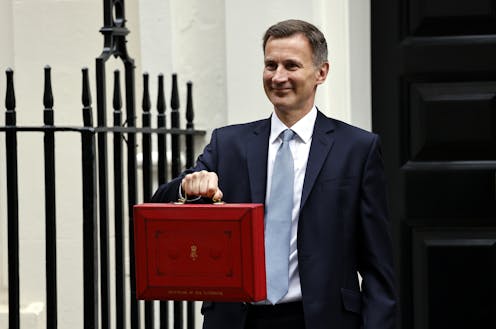why the UK's fiscal watchdog does not share the chancellor's optimism
- Written by Ben M Clift, Professor of Political Economy, University of Warwick

UK chancellor Jeremy Hunt confidently described his first budget of 2023[1] as a “budget for growth”[2]. He went on to offer a fairly upbeat assessment of both economic performance and future prospects, arguing[3]: “The declinists are wrong and the optimists are right.”
Hunt’s aim to provide a shot in the arm for UK productivity is largely built around plans to increase labour force participation, notably through financial support for childcare, encouraging business investment, and by creating 12 investment zones in struggling towns and cities.
But his optimistic assessment of the UK’s growth prospects seems rather at odds with most expert evaluations. The International Monetary Fund, for example, forecasts[4] that the UK will be the worst performing of the major economies in 2023.
The Office for Budget Responsibility[5] (OBR), Britain’s independent fiscal watchdog, is another key voice on UK economic policy. Established in 2010 to ensure the observance of public spending rules[6], and to provide independent evaluation and oversight, it exemplifies the technocratic economic governance[7] that has become a common feature in the west.
Its recent economic assessment[8] does offer some positives. UK economic performance is already better than the OBR expected as recently as November 2022. It seems the UK will likely avoid a technical recession (two-quarters of falling GDP), and inflation is forecast to fall from 11% to 3% by the end of 2023.
Overall though, the OBR presents a far less rosy picture of Britain’s growth prospects and the state of its public finances than the chancellor.
Its March 2023 report[9] consistently underlines how “persistent supply-side challenges” such as low investment, labour market inactivity, weak skills and training infrastructure, and sluggish productivity “continue to weigh on future growth prospects”.
It also focuses on very high levels of public debt – currently close to 100% of GDP – and warns[10]: “Jeremy Hunt today needs to work a lot harder than his predecessors just to keep debt from rising in normal times, and normal times have been hard to come by in recent years.”
As tough times for most households continue, the OBR highlights its expectation that living standards will fall by 5.7% until 2024. This dramatic reduction is the largest two-year fall since records began in the mid 1950s. Nor does the OBR see any end in sight, with living standards in 2027-28 still predicted to be lower than pre-pandemic levels.
Meanwhile, the UK’s tax burden is set to reach a a post-war high of 37.7%[11] of GDP, with public spending as a proportion of GDP expected to settle at 43.4%[12] – its highest sustained level since the 1970s.
Put simply, the UK has historically high tax rates and public spending levels, at the same time as living standards are falling. This is unprecedented.
While OBR forecasts – like all economic predictions – will never be wholly accurate[14], the OBR has gained a strong reputation for judicious, evidence-based evaluation, and for holding government fiscal policies to account[15].
Beyond the cost of living crisis, the OBR notes a threefold crisis of growth within British capitalism. This speaks to persistent structural weaknesses[16] within the UK economy – some dating back to before the global financial crisis. The OBR’s is a very different story from the chancellor’s talking up of growth prospects.
First, it highlights problems with labour force participation and high levels of inactivity, especially among older workers and those with health problems. These inactivity levels rose sharply with the pandemic[17].
Second, the OBR notes the “stagnation in business investment[18]” since 2016. Investment uncertainty, it says, has been ramped up by Brexit[19], and then compounded by COVID[20], higher energy prices and higher interest rates[21].
Third, the OBR consistently underlines how UK productivity has grown at only half the rate[22] of what it was before the global financial crisis of 2008. UK productivity performance is notably weak[23] by international standards.
To be fair to him, the chancellor’s latest plan does at least seek to address some of these deep-seated structural problems. Indeed, the OBR has now raised its assessment of potential output (by a modest 0.5% of GDP) by the end of its forecast, partly due to Hunt’s measures to boost labour supply.
But the modesty of this increase, set against the scale of the structural problems, means these measures are unlikely to resolve Britain’s growth crisis. The OBR sees the UK economy’s medium-term potential growth rate as a very meagre 1.75% of GDP.
The overall OBR view is of ongoing “weak underlying momentum” and “subdued” prospects. But those descriptions wouldn’t have sounded as uplifting or politically optimistic as a “budget for growth”.
References
- ^ budget of 2023 (theconversation.com)
- ^ “budget for growth” (www.gov.uk)
- ^ arguing (www.gov.uk)
- ^ forecasts (www.imf.org)
- ^ Office for Budget Responsibility (obr.uk)
- ^ public spending rules (link.springer.com)
- ^ technocratic economic governance (global.oup.com)
- ^ economic assessment (obr.uk)
- ^ March 2023 report (obr.uk)
- ^ warns (obr.uk)
- ^ high of 37.7% (obr.uk)
- ^ 43.4% (obr.uk)
- ^ IgorZh/Shutterstock (www.shutterstock.com)
- ^ wholly accurate (ukandeu.ac.uk)
- ^ policies to account (www.oecd.org)
- ^ persistent structural weaknesses (journals.sagepub.com)
- ^ sharply with the pandemic (obr.uk)
- ^ stagnation in business investment (obr.uk)
- ^ ramped up by Brexit (obr.uk)
- ^ compounded by COVID (obr.uk)
- ^ higher interest rates (obr.uk)
- ^ half the rate (obr.uk)
- ^ notably weak (www.ons.gov.uk)







